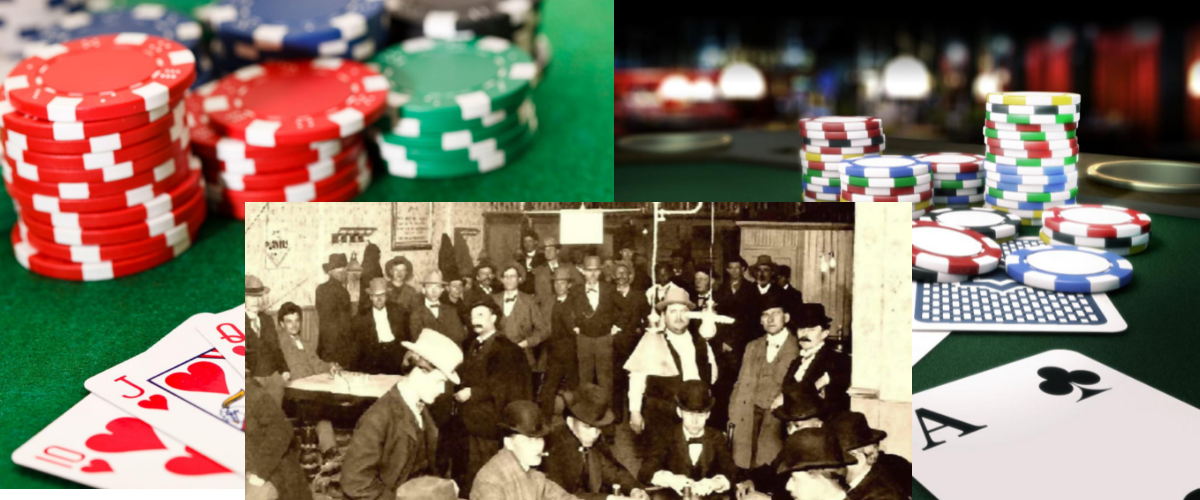History of Poker

The game of poker can trace its origins back to 9th century China, where the first recorded mention of playing cards is found. By the 11th century, playing cards had spread throughout Asia and eventually made their way into Egypt and Europe. During this period, cards commonly featured faces of famous characters, and the concept of suits originated in China. Many cards had four suits representing magnitudes of a currency. The modern 52-card deck design, with four suits and reversible face cards, evolved from the French design.
19th Century New Orleans and the Emergence of Poker
In the 19th century, the first signs of modern poker began to appear in and around New Orleans. The game evolved from a combination of the English game Brag and the German game Pochen, which means “to bluff.” French colonial settlers in New Orleans brought their own game, Poque, based on Pochen. The term “poker” was coined and applied to this new game. Poker quickly spread through Louisiana and up the Mississippi River to the rest of the country.
The Spread of Poker in North America
By the mid-19th century, stud poker had become widespread throughout North America. Saloons in western towns typically featured poker tables for locals to play on. By 1875, various poker variations, including stud and draw, were documented in “The American Hoyle,” a gentleman’s handbook of games.
20th Century and the Rise of Tournament Poker
Poker’s popularity surged in the 20th century, particularly with the advent of tournament poker in casinos. The World Series of Poker (WSOP), which began in 1970, significantly contributed to the fame of Texas Hold’em poker. By the 1980s, poker was widely known and featured in many popular television shows, such as “Star Trek.”
The Online Poker Boom
The early 21st century saw a massive spike in poker’s growth, driven by the televising of live tournaments and the introduction of online poker. Online poker revolutionized the game by making it accessible to a global audience. Here are some key milestones in the rise of online poker:
- Early Development. Online poker began in the late 1990s, with the first real money poker game dealt in 1998 by Planet Poker. Despite technical issues and limited internet speeds, online poker slowly gained traction.
- The Moneymaker effect. A significant boost to online poker came in 2003, when Chris Moneymaker, an amateur player who qualified for the World Series of Poker Main Event through a $39 online satellite tournament, won the championship and its $2.5 million prize. This event, known as the “Moneymaker Effect,” demonstrated that anyone could win big, prompting a surge in online poker participation.
- The Rise of Major Platforms. Several major online poker platforms emerged in the early 2000s, offering a variety of games, tournaments, and promotions that attracted millions of players worldwide:
- PartyPoker, launched in 2001, was one of the first online poker sites to achieve widespread popularity. It gained prominence through aggressive marketing and attractive promotions. Partypoker continues to be a major player in the online poker market, offering a variety of cash games and tournaments.
- PokerStars is one of the largest and most popular online poker platforms globally. Launched in 2001, it quickly became a leader in the industry, known for its extensive range of games and tournaments. PokerStars hosts the annual World Championship of Online Poker (WCOOP) and the Spring Championship of Online Poker (SCOOP), which are among the most prestigious online poker tournaments.
- Full Tilt Poker, founded in 2004, became known for its innovative software and high-profile endorsements from professional poker players. It was particularly popular for its high-stakes games and unique features like “Rush Poker,” a fast-fold poker format. Despite facing legal issues in 2011, Full Tilt Poker was eventually acquired by PokerStars’ parent company and integrated into its platform.
- 888poker, part of the 888 Holdings group, has been a significant player in the online poker industry since its launch in 2002. Known for its user-friendly interface and recreational player focus, 888poker offers a variety of promotions and tournament series to attract a broad player base.
- Technological Advancements. Advancements in technology enhanced the online poker experience, with improved software, faster internet speeds, and mobile apps allowing players to enjoy poker anytime, anywhere. Features like multi-table play and live dealer games added to the appeal.
- Legal Challenges and Regulation. The growth of online poker-faced significant legal challenges, particularly in the United States. The Unlawful Internet Gambling Enforcement Act (UIGEA) of 2006 caused many platforms to withdraw from the US market. However, regulated markets emerged in various countries, providing a legal and secure environment for online poker.
Continued Growth and Popularity
Despite legal hurdles, online poker continues to thrive. Major tournaments, such as the World Championship of Online Poker (WCOOP) and the Spring Championship of Online Poker (SCOOP), offer substantial prizes and attract top players. Streaming platforms like Twitch have also played a role in popularizing online poker, with professional players streaming their games and engaging with audiences.
Poker has evolved significantly since its early 19th-century beginnings in the deep South and continues to grow, captivating players worldwide both in physical and virtual formats.






